There is enormous pressure on the government from both sides of the Atlantic Ocean to give up the protection of the Transcarpathian Hungarian community, but this will not happen under any circumstances, Minister of Foreign Affairs and Trade Péter Szijjártó said in Brussels on Tuesday.
He added that the convening of the ministerial-level meeting of the NATO-Ukraine Committee violates the unity of NATO, and Hungary will not support any meaningful integration approach until the rights of the Hungarian national community in Ukraine are restored. During the break of the so-called general affairs council of the European Union member states, the head of the ministry said that in the morning he had a meeting with NATO Secretary General Jens Stoltenberg, who confirmed that Hungary is a reliable ally that adds to the strength of the military organization.
"Hungary contributes to the security of the European and transatlantic community, it is a reliable NATO ally. However, we also see NATO as a community of values (…) That is why we consider it important that only countries that respect the rights of national communities can get closer to NATO," he declared.
"Unfortunately, this is not the case in Ukraine today. Of course, this situation is not new, since 2015, the rights of national communities, including the Hungarian national community, have been practically continuously curtailed," he added. He reminded that the government has therefore continuously blocked the convening of the NATO-Ukraine Committee at the ministerial level in recent years, so this has not taken place until now. He emphasized: although there is a lot of pressure on Hungary in the international arena to give up the protection of the Transcarpathian Hungarian national community, the NATO Secretary General showed understanding on the issue and took this concern seriously.
"However, the Secretary General announced that for various reasons, the details of which are not my responsibility, he will convene the ministerial-level meeting of the NATO-Ukraine Committee during the Council of Foreign Ministers to be held on April 4, despite Hungary's negative position, despite the fact that we think that this meeting could only be convened if there was a unanimous will," he said. "
This decision violates the unity of NATO, the procedure for a unified will, but at the same time, we cannot do anything but take note of the Secretary General's decision," he said. He added: Stoltenberg promised to give space to suggestions related to minority protection at this meeting. He stated:
"of course we stand by our original position, I would like to make it clear that we will not support any meaningful integration approach towards NATO or the European Union with regard to Ukraine until the rights of the Hungarian national community are restored in Ukraine".
No matter how great the pressure will be, we will not give up on the protection of Transcarpathian Hungarians, we will continue to stand up for Transcarpathian Hungarians," he said. Regarding Hungary's role within NATO, he said that the government is proud of the developments that increase the strength of the armed forces, and that our country will soon meet the expectation that two percent of the gross domestic product (GDP) will be spent on defense spending, and 20 percent of this on development, which is already being implemented. . "Hungary is already fulfilling one of these two expectations, well before the deadline and the promises. Moreover, at the end of the month, Hungary's contribution to NATO's forces will reach an important milestone, as the multinational division headquarters, which will be located in Székesfehérvár, will reach its initial operational capability," he underlined. He added that the importance of this is shown by the fact that the commander-in-chief of NATO's European forces is visiting Hungary on this occasion at the invitation of the Hungarian defense minister. The minister also referred to the meeting with the European Union Energy Commissioner Kadri Simson and underlined that Hungary's energy supply is secure, thanks to the brave investments of recent years, which in some cases were implemented despite threats. "If we had not built a gas pipeline in the south-southeast direction, natural gas supply to Hungary would be physically impossible today, but given the brave investments and brave decisions, Hungary's energy supply is safe," he said. He emphasized: diversification would require serious infrastructure developments in the region, and in this matter Hungary will act together with Bulgaria, Greece and Romania.
"I discussed this with the energy commissioner and asked him to treat this as a European matter. There is constant pressure from Brussels, which pushes the member states in the direction of buying natural gas from other sources compared to before. But we know that buying natural gas requires not only natural gas, but also a pipeline through which it can be transported," he said. "The issue of diversifying the energy supply is indeed a European issue, as it is being forced from Brussels, and if it is a European issue, then European resources are also needed," he declared.
He also touched on the "unworthy situation" that the Croatian oil company rejected Mol's bid for a long-term capacity contract and instead is only willing to extend the contracts for three months. "Taking advantage of the war situation, the Croatians are asking Mol for a multiple of the market price as a transit fee for transporting oil on the Adriatic pipeline," he added, pointing out that although capacity expansion investments have been promised for half a year, nothing has happened in this area to date. "This is not only Croatia's responsibility, it is also Brussels' responsibility, since it is again a European issue that alternative routes for transport routes made impossible due to the war should be available if necessary," he stated.
Source: KKM
Featured Image: Facebook











